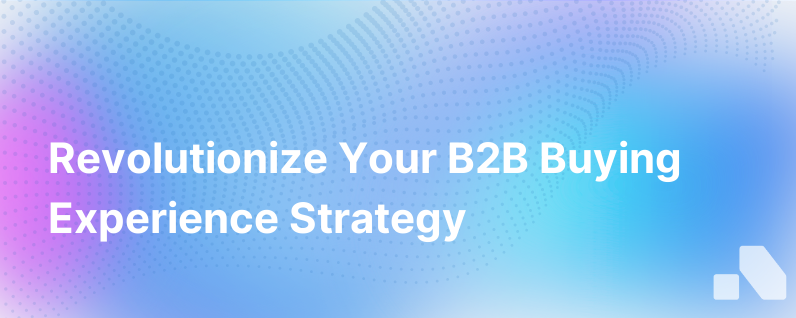B2B Buying Experience
Published on November 27, 2023 by Sawyer Middeleer
The B2B buying experience, often considered the backbone of commercial interactions, dictates the dynamism of business relationships. Traditionally, B2B transactions have been characterized by formal, transactional engagements; however, the digital transformation and evolving customer expectations are reshaping this realm. It’s increasingly essential for businesses to deliver purchasing journeys that are as comprehensive, personalized, and user-friendly as their B2C counterparts.
Understanding the B2B Buying Experience In essence, the B2B buying journey is intricate. Unlike impulse-driven, individualized B2C purchases, B2B buying processes are often longer, involve a multiplicity of stakeholders, and are data-driven pursuits where high levels of scrutiny and deliberation are standard. The experience encompasses everything from the initial contact and research phases through negotiation, purchasing, implementation, and post-purchase service.
Elements Influencing the B2B Buying Experience Understanding the components that shape the B2B buying experience is crucial. A seamless buying experience is a symphony of several orchestrated elements:
Research and Evaluation
In B2B transactions, decision-makers often embark on a meticulous research process. The proliferation of digital content has placed enormous power in the hands of these buyers; they are typically well into the decision-making process before ever contacting a sales representative. Vendors must deliver quality information through content marketing, social media engagement, and SEO-optimized digital touchpoints.
Multi-Stakeholder Dynamics
B2B purchasing decisions involve multiple levels of approval and a range of perspectives from different departments. An impactful B2B buying experience must cater to the needs and concerns of each stakeholder. Tailoring communication and presenting solutions that encompass the collective objectives of the prospective client's team is vital for a fruitful interaction.
Personalized Engagement
Creating personalized experiences can no longer be reserved for B2C customers. B2B buyers expect content and solutions that directly speak to their specific industry challenges, business size, and individual roles within their organization. This tailored approach involves utilizing CRM systems, marketing automation, and, most importantly, a deep understanding of customer pain points.
Ease and Efficiency
Speed and simplicity in navigating offerings, obtaining relevant information, and moving through the purchase process can greatly impact the buying experience. This calls for a tech-savvy approach, utilizing platforms, tools, and systems that streamline the buying cycle and make every interaction as efficient and straightforward as possible.
Omnichannel Experience
Customers may interact with a business through multiple channels including in-person meetings, social media platforms, emails, and more. An omnichannel strategy ensures a consistent and integrated experience across all these platforms, keeping messaging coherent and accessible regardless of the point of contact.
Post-Purchase Support
The B2B buying journey doesn't end at purchase; it extends to the post-purchase experience. Implementation support, training, and customer service are angles of the buying experience that significantly affect customer loyalty and potential repeat business.
Trust and Reliability
Business buyers seek security and reliability in transactions. Establishing a reputation for dependable products and services, as well as a trustworthy sales process, is critical. Trust is established over time through consistent, honest engagement, and high-quality customer experiences at all stages of the buying cycle.
Challenges and Innovations
-
The Challenge of Digital Transformation Many traditional B2B businesses struggle with the transition to digital-first buying experiences. Yet, buyers' increasing preference for online interactions demands a shift in focus to digital customer engagement strategies.
-
The Rise of Self-Service Portals The B2B sector is increasingly adopting self-service portals which empower customers to access information, manage accounts, and make purchases at their convenience, without the need for direct salesperson interaction. This facilitates a more buyer-centric journey.
-
The Importance of Data Analysis Data analytics plays a significant role in understanding and refining the B2B buying experience. Leveraging customer data helps in personalizing engagements and predicting buying behaviors, thus allowing for a more nuanced approach to customer interaction.
Optimizing the B2B Buying Journey For businesses looking to enhance their B2B buying experience, the following steps can steer them towards optimization:
-
Leverage Technology for Personalization: Implement CRM and marketing automation solutions that can deliver tailored content and recommendations to different buyer personas.
-
Streamline Sales Processes with AI: AI-driven tools can provide valuable insights during the sales cycle, pointing out optimal times for contact, suggesting content, and facilitating faster responses.
-
Concentrate on User Experience in Design: Websites, portals, and apps should be designed with the user in mind, ensuring intuitive navigation and access to resources.
-
Invest in Customer Education and Content: Educative content and thought leadership not only position a company as an industry expert but also cater to the evaluative nature of B2B buyers.
-
Monitor and Act on Feedback: Consistently collect feedback through surveys, social media, and review sites, and adjust strategies accordingly to cater to evolving buyer preferences.
Conclusion: A Strategic Imperative For B2B companies in today's competitive landscape, mastering the buying experience is more than just a customer service initiative; it's a strategic imperative. Ignoring the growing expectations around this experience risks losing buyers to more agile competitors who understand the importance of every step in this complex journey.
As businesses navigate the multifaceted world of B2B sales, incorporating a thoughtful, buyer-focused approach will be paramount. Whether through leveraging cutting-edge technologies like Aomni to gain competitive insights or refining customer touchpoints to ensure seamless interactions, there are ample opportunities to create B2B buying experiences that not only meet but exceed modern buyer expectations.